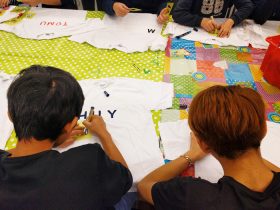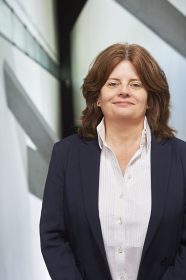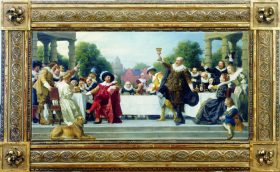Workshops for young refugees

Whether in Hebrew, Arabic, or German, there are lots of ways to write one’s name; photo: private
What’s written in a Jewish marriage contract? As a minority, how do you secure your civil rights? And why is Hanukkah celebrated for eight days? My work as a guide at the Jewish Museum isabout how to coax stories from objects on display — but also about language. The first thing I did when I began working here about four years ago was to look up how to say “ruminants with cloven hooves” in French. You need to have this phrase at the ready if you want to explain Jewish dietary laws to a group of French museum visitors. My French didn’t help much, however, when I led the first workshops in August of 2016 for Welcome Classes. → continue reading
New program director of the Jewish Museum Berlin holds lecture for future museum generation
1) Dear Mrs. Meijer-van Mensch: over the last years you have worked for various institutions in different countries. What distinguishes the museum landscape in Germany from other countries in your opinion?

Program director Léontine Meijer-van Mensch puts much value upon the promotion of the future museum generation; Jewish Museum Berlin, photo: Yves Sucksdorff
First I would like to say that in Germany – contrary to the Netherlands – there is a widely supported notion that culture in general (and therefore museums) is important. It is stimulating to be able to work in such an environment. Before World War II German museology was very influential worldwide. After the war Germany lost its leading position and new developments in the international museum world were not always fully embraced. An example is the importance of education and the role of educators within the organization of the museum. → continue reading
– The Story of a Search

This oil sketch entitled Das Gastmahl der Familie Mosse (The Mosse Family Banquet) was restituted to the community of heirs of Felicia Lachmann-Mosse; Photo: Jewish Museum Berlin, Jens Ziehe.
Today is the International Holocaust Remembrance Day when we also remember the consequences of the criminal Nazi regime, which can still be felt today. One of these consequences is that a lot of museums are still holding cultural artifacts that were unlawfully confiscated from their owners during the Nazi era. Thus the Jewish Museum Berlin restored the oil sketch Das Gastmahl der Familie Mosse (The Mosse Family Banquet) to the heirs of Felicia Lachmann-Mosse in December last year. How was this decision reached? Provenance research has attracted increasing attention in recent years and caused frequent rumblings in the media – but how is it actually carried out? → continue reading


